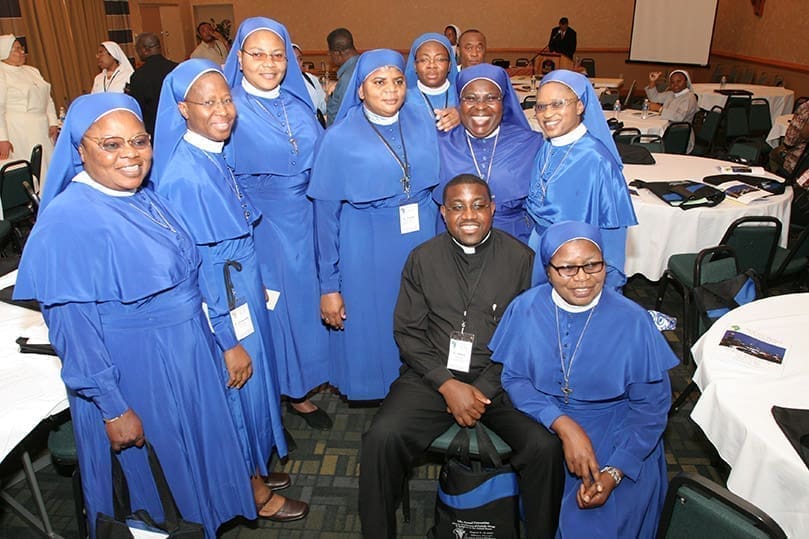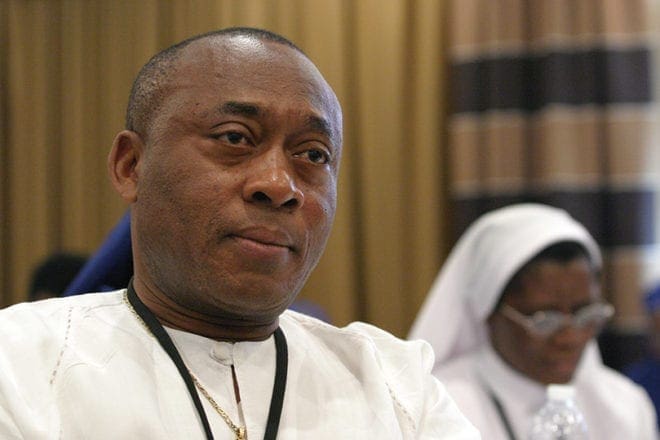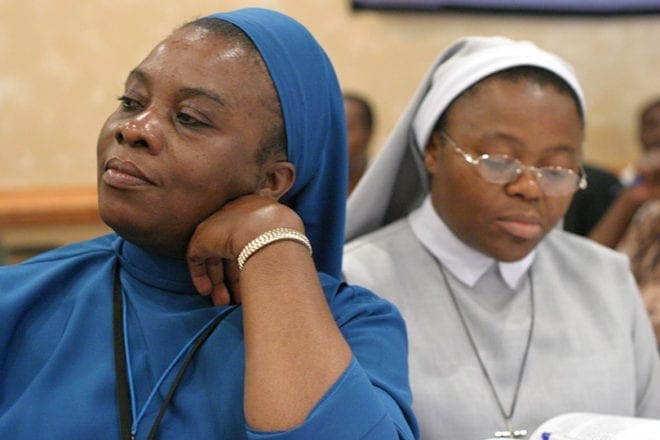 Photo By Michael Alexander
Photo By Michael AlexanderAtlanta
Atlanta Meeting A ‘Reunion’ For African Clergy, Sisters
By ANDREW NELSON, Staff Writer | Published August 20, 2009
More than 100 African priests and nuns gathered here for three days to celebrate their heritage and reconnect.
Speakers at the 10th annual convention of the African Conference of Catholic Clergy & Religious in the United States offered insights on leadership for the African natives serving as missionaries in the United States. The meeting, held at a hotel near the Atlanta airport, took place from Aug. 6-9.
The organization’s national president, Father Martins Emeh, said African clergy serving across the country see greater acceptance among Catholics.
There have been more than 30 ordinations of African priests in the United States since 1999 and more Africans are taking on church leadership roles, from serving as pastors and vocation directors to one recently being named a monsignor, Father Emeh said.
There are five sisters and two priests from Africa serving in the Atlanta Archdiocese, according to a directory of the organization.
“These individual achievements spur us on to victory as a group. Although we recognize that there are more laurels yet to be won, these isolated victories are cause for great rejoicing and thanksgiving to God,” he said.
Reflecting the diversity of Africa, the group prayed in different languages. Choirs from the Gambian and Nigerian communities contributed to the celebrations.
Archbishop Wilton D. Gregory and Tom Peterson, president and founder of Catholics Come Home and Virtue Media, spoke to them about leadership, the conference’s theme.
Archbishop Gregory praised the African clergy for their work in dioceses across the country.
“We are so much better for your presence,” he said.

Msgr. Anselm Nwaorgu, pastor of Church of the Blessed Sacrament/St. Charles Barromeo Church, Newark, N.J., listens to Archbishop Gregory address the assembly. He was elevated to monsignor back on May 30 and he will be officially installed Sept. 13. Photo By Michael Alexander
On leadership, the archbishop said African clergy may be surprised about the expectations of parishioners. But to be successful missionaries, priests and sisters must “always be one with the people,” he said.
“We profess the same faith. But we do embrace a variety of pastoral situations that distinguish us,” he said about the American church.
A successful missionary will “know the heart of those we seek to serve and point them to a future that is brighter than their past, always rooted in Christ,” said the archbishop.
Parishes are the “backbone of the church,” vibrant, egalitarian, with many women serving as church leaders, he said. Laywomen and laymen are “indispensable” in the life of a parish, he said.
The bond of baptism strengthens the connection between parishioners and the priests. He said Americans have an expectation to see their priests and spend time with them at social events.
“That common bond should bring us together,” the archbishop said.
Dominican Father Bernard Oniwe, who is studying for his doctorate and serving in Charleston, S.C., said the archbishop’s words have proven true for him.
“As a good missionary, you try to accept the good things. I like the laity involvement,” he said.
Overall, Father Oniwe said the gathering of fellow Africans is a “cushioning (from) being a long way from home.”
Sister Jennifer Otuonye, a member of the Daughters of Mary Mother of Mercy congregation, has lived in the U.S. since 1994. She works in Indianapolis, Ind., with refugees.
It is her first event in several years and she wanted to attend to catch up with other Africans, she said.

Daughters of Divine Love Sister Ignatia Utulu, left, of Portland Oregon and Handmaids of the Holy Child of Jesus Sister Rosemary Arrah of Omaha, Neb., attend the 10th Annual National Convention of the African Conference of Catholic Clergy & Religious In the U.S. The convention took place at the Best Western Atlanta Airport Hotel, Aug. 6-9. Photo By Michael Alexander
“It is kind of a reunion. It is an opportunity,” she said.
Father Henry Atem, a parochial vicar at St. Peter Chanel Church, Roswell, said the conference rejuvenates him. Father Atem is a native of Cameroon.
One of the biggest hurdles for the immigrant clergy is the cultural differences, he said. For instance, thinking of his experiences from living in Cameroon to use in a homily may make no sense to 21st-century American parishioners. So he has to ensure his examples relate to people, he said.
Peterson, an ad executive, said his organization is dedicated to using the media to win back Catholics by “gently, lovingly inviting them home.”
While some 24 percent of Americans identify themselves as Catholics, only one-third go to weekly Mass, he said.
“We need to go out of the temple and invite them where they are,” he said.
Peterson’s media organizations are running ads on MTV, Black Entertainment Television and other channels to reach the targeted 30-something audience, he said. The ads guide viewers to a Web site with information that links them to parishes, faith information and personal stories.
He showed the group three commercials, including the popular “Epic” commercial that traces the history of the church, from its founding by Jesus to Peter as the first pope, its universal reach and its role in establishing hospitals and universities.
“The message really matters,” he said.
And it has worked. Based on a study after showing the ads in the Diocese of Phoenix, Ariz., the average increase in Mass attendance was 12 percent, or an increase of some 90,000 people.